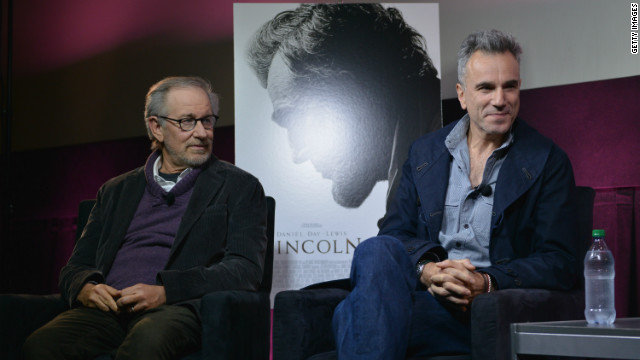
- Steven Spielberg is bringing Abraham Lincoln to the movies with "Lincoln"
- Daniel Day Lewis plays the president, and took a year to prepare
- Spielberg uses the 13th Amendment as a framing device
- While war raged, Lincoln also was dealing with personal issues at home
(Time.com) -- Rick Stengel: Abraham Lincoln is in many ways the most compelling figure in U.S. history, yet the popular culture around him in terms of movies has been pretty minimal. Why is that?
Steven Spielberg: It's one of the big mysteries. They float so many trial balloons with Lincoln's face every year in the form of advertising, spoofs, parodies, "Saturday Night Live" sketches, Presidents' Day commercials. Lincoln has kind of become a caricature. One of the last movies, which I haven't seen in 15 or 20 years, that was about Abraham Lincoln was in the '30s, with Henry Fonda — "Young Mr. Lincoln." I don't understand why it's taken so long for anybody, let alone our group, to bring Lincoln to a movie theater.
Stengel: You use a fascinating framing device for the movie: the passage of the 13th Amendment, abolishing slavery.
Spielberg: The 13th Amendment was critical to Lincoln, because he knew that if the war ended, this would never get through. The South couldn't live without slavery. They might cease hostilities, but Lincoln always believed that unless we abolish slavery before this war ends, the end of this war will just be a momentary pause between this war and the next war. So he knew he had to get this thing done, but he didn't have the votes. That's at the heart of our movie, this fight to get the votes, to do the right thing.
Stengel: There's an English expression, "Cometh the moment, cometh the man." How much of it was Lincoln at that moment, or did the moment make him?
Spielberg: Lincoln had the ambition. He had a beautiful vision for America. But I don't know what kind of progress he would have made without the crisis that fell into his lap. I also don't know what kind of a president FDR would have become without the Great Depression and World War II, or what Kennedy would ultimately have been remembered for without all of us standing on the brink of nuclear holocaust during the Cuban missile crisis.
Time.com: How the greatest living actor became Lincoln
Stengel: Let's talk about his temperament. His leadership style in many ways seems so alien to what we value today.
Spielberg: Taking all of his traits—of long, deep thought, of staring deeply into the future, taking the broad view, respecting the past, exploring deep into the cold depths of himself while his entire Cabinet sat around waiting for him to make a decision about anything—I'm not sure there's a mayoral position that would be suitable for him in this kind of adrenaline-fueled era that we all exist in. Even then, the newspapers were going after him.
Stengel: One of the things that comes through in the movie is Lincoln's relationship with his wife, his relationship with his youngest son. He would get down on the ground all the time. It showed that he wasn't that statue that was standing up there 20 feet high.
Spielberg: He certainly did everything that he needed to do to hold his family together, not just this country. He had lost [his 11-year-old son] Willie two years ago to typhoid fever. Mary spent years mourning the loss of Willie. In [Doris Kearns Goodwin's] book "Team of Rivals," what precedes our story is two years of Mary shunning the whole family and spending time holding séances and trying to reach out and communicate across the thin veil to Willie. Lincoln had that burden on his shoulders. He was really carrying a lot of weight during that time.
Stengel: Daniel Day-Lewis' performance integrates all these different sides of Lincoln in a really extraordinary way. What was that like directing him?
Spielberg: Daniel did something at first that made me sad. He wanted to wait a year. And it was a masterstroke, because he had a year to do research. He had a year to find the character in his own private process. He had a year to discover how Lincoln sounded, and he found the voice. He had Lincoln so embedded in his psyche, in his soul, in his mind, that I would come to work in the morning and Lincoln would sit behind his desk, and we would begin.
Stengel: I believe you called him Mr. President?
Spielberg: All during the picture I called him Mr. President, but that was my idea. I also wore a suit every day, which I don't usually do when I'm directing. Everybody was dressed up in their period wardrobe. I did not wear 19th century wardrobe. I wore pretty good clothes from this era. I just wanted to blend in. We knew we were in the 21st century at all times. But once you stepped onto the stages of the White House, everybody really felt that they were making a contribution to remembering this critical moment in our shared history.
See the full story at Time.com.
© 2012 TIME, Inc. TIME is a registered trademark of Time Inc. Used with permission.